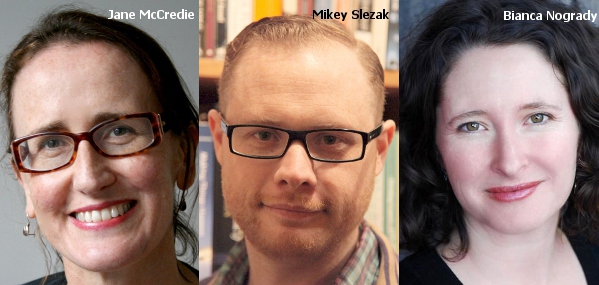Thanks to Claire Harris for her run-down of the ASC/BIG science blogosphere team.
There is no doubt that the BIG Science Communication Summit provided a memorable experience for those that attended. And… for those who watched from afar via the EASELivestream and on social media (for example, using the hashtag #bigsci13 on Twitter).
ASC was proud to be a community partner with the Inspiring Australia, TechNyou and ScienceRewired teams and to be part of delivering the vision for the BIG Science Communication Summit. The event aimed to deliver an opportunity for science communicators to collaboratively discuss the challenges they face individually and collectively, and to develop solutions through engaging both before and during the event.
ScienceRewired provided an opportunity for six ASC members to have berths on the social media team – to drive discussion and debate – and to attend the event.
The ASC Live Bloggers were:
- Amelia Swan (@SwanAmelia)
- Victoria Leitch (@craniophiles)
- Melissa Lyne (@malyne)
- Kali Madden (@ASCkali)
- Sarah Lau (@LaLaLausy)
- Sam Askin (@samaskin). Sam actually contributed from his office in Townsville. Kali said: We were all amazed that he could be so ‘in the moment’ and we thought he must have been sitting in the gallery with the rest of the team!
The super team of live bloggers (ok, yes I was one of them but hell, I’m going with super!) were encouraged to explore topics of interest and contribute Tweets, blogs, photo galleries. The ASC live bloggers also played an important part in reporting the happenings at the event, particularly the workshops, as they weren’t being live-streamed.
Kylie Sturgess, the Social Media Coordinator for ScienceRewired led us through the, at times for me slightly confusing, social media playground set up for the event. (I for one had some experience in Twitter, Facebook and blogs but Storify, live streaming… not so much.)
Kylie Sturgess actively podcasted, networked and blogged/Tweeted/photographed the event along with the team. She gathered some great stories on Storify.
I think I can speak on behalf of the team to say that Kylie was a bundle of fun and a font of knowledge on social media.
Apparently #bigsci13 trended on Twitter on both days for Brisbane, Melbourne and Sydney and we got feedback from attendees present and online saying they appreciated the contributions from the team.
Bloggers’ selfie: Claire Harris (left), Vanessa Hill (middle), Victoria Leitch (top), Kylie Sturgess (bottom)
Some Tweets:
@sciencerewired: Missed a session from yesterday? Didn’t see it livestreamed? Thanks to our Social Media Team, catch up at: http://sciencerewired.org/summit/category/blog/ … #BigSci13 This Tweet was Retweeted 14 times.
@DoUBelieveInDog: @sciencerewired Can confirm you are coming through loud and clear and amazeballs on the live stream #bigsci13 🙂 (Just need more #dogs!)
See some of the live bloggers’ contributions on one of the Storifys.
Check out some of the blog posts written by the team:
- Stream 1: It’s a two way street: Engaging all Australians: by Sarah Lau
- Stream 1: It’s a two way street: Engaging all Australians: by Victoria Leitch
- Stream 2: Participative science: Encouraging the best in citizen science: by Claire Harris
- Stream 3: Beyond tweets and blogs: leveraging the changing media landscape: by Melissa Lyne
- Session 4: Diminishing degrees of separation: developing collaborative approaches across sectors: by Amelia Swan
- Stream 5: Data at work: developing the evidence base to guide future action
Thanks for a great experience and all your hard work ASC crew, Kylie and indeed all involved in the event.
Bloggers’ selfie: Will Grant (left), Sarah Lau (middle), Amelia Swan (left)




